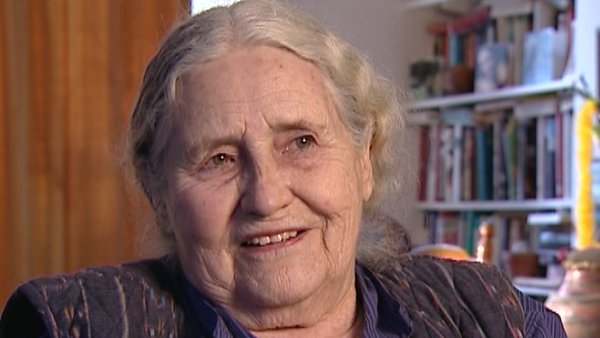NEXT STORY

Teaching through songs and stories
RELATED STORIES

NEXT STORY

Teaching through songs and stories
RELATED STORIES


|
Views | Duration | |
|---|---|---|---|
| 11. 'If Neanderthals, why not dwarfs and gnomes or whatever else?' | 506 | 03:32 | |
| 12. How to write non-realistic fiction | 532 | 02:34 | |
| 13. Feelings behind books | 444 | 03:31 | |
| 14. The Golden Notebook | 537 | 00:58 | |
| 15. Dealing with an alien child | 1 | 587 | 02:57 |
| 16. 'Ben is me!': why kids like Ben | 484 | 02:36 | |
| 17. The pleasure of finding things out | 365 | 01:51 | |
| 18. Solutions come in dreams | 450 | 04:38 | |
| 19. The sense of adventure is a gender thing | 1 | 389 | 02:10 |
| 20. Mara and Dann | 253 | 04:40 |


If I were to write a book all about helicopters and drugs and... and guns, I would bore myself silly, and I guess I would bore every woman that read it also, but the men would like it. So I thought I would simply get rid of our civilisation at all... I'd just get rid of it, by... I did that by making an ice age, sitting on top of Europe, which... became quite interesting in itself. So... the people living, knowing that the ice age was coming, built replicas of the... our great cities, in North Africa... which... on which then became the permafrost, right? This is where for... for us to know how wonderful we are, right? We... this wonderful civilisation of ours. So there are these cities, and... Mara and Dann, which is where I'm coming to in a long loop...
I had a brother whom I didn't get on with at all, but when he was little I adored him, and simply because I didn't get on with him when we were older, I tended to forget just how much I adored him when he was little. I have a brother... a sister and a brother – Mara and Dann – and Mara is very sisterly with her brother, and looks after him. And that entire period of writing, at least a third of Mara and Dann, I dreamt every night what I was going to write the next day. It was like an unfolding... it was running in my head – the brother and the sister. It was as if I wasn't writing it, my unconscious was writing it.
Now, this can happen, of course it can happen quite differently from literature – it can happen about anything. But this was an extraordinary experience because it was of course transmuted into a sort of semi-savage background because I wanted to get rid of our civilisation. And for me it was quite painful because I remembered how much I did love this child, which I've decided not to remember. So you see this... also happen: you can invite memories you don't particularly want.
Now, when I talk about dreams, this is a culture which on the whole is not sympathetic to this idea. You can say to some people, 'Oh, I never dream'. There's always a note there of... of superiority... 'Oh, I never dream'. Or, if the people say, 'Oh yes, I always dream, and it's so helpful', and so on. There is a note there of... it's a very funny note, it's not superiority, it's as if they've got hold of something and they don't want it to be taken away from them, because this culture is extremely unhelpful to this kind of idea. Hang on a minute...
Yes, there is a... a society over – once again, in South-East Asia – where they use dreams for the bringing up of their children. The children are told in the morning to come to the adults: 'What did you dream?' And... built on what they dreamed, their... what they are, what sort of feelings they have... is revealed, and the children are all the time taught to do what they dream. I think probably the world being as it is now, my feeling is this is probably already gone, this culture, because all kinds of cultures that were going until quite recently go because of our kind of idea, but that... until recently, this was a culture that used dreams consciously, and what we used to call the Red Indians used dreams consciously for each other and their children.
British writer Doris Lessing (1919-2013) was awarded the 2007 Nobel Prize in Literature. Her novels include 'The Grass is Singing', 'The Golden Notebook', and five novels collectively known as 'Canopus in Argos'. She was described by the Swedish Academy as 'that epicist of the female experience, who with scepticism, fire and visionary power has subjected a divided civilisation to scrutiny'. Lessing was the 11th woman and the oldest ever person to receive the Nobel Prize in Literature.
Title: "Mara and Dann"
Listeners: Christopher Sykes
Christopher Sykes is an independent documentary producer who has made a number of films about science and scientists for BBC TV, Channel Four, and PBS.
Tags: North Africa, Mara and Dann, South-East Asia
Duration: 4 minutes, 40 seconds
Date story recorded: June 2007
Date story went live: 21 October 2011